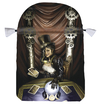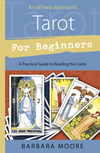Tarot: The Moon, Mysteries, and Things Unknown

The Moon is such an interesting card. It is one of the cards, along with the Fool and the Hanged Man, whose meaning has really changed over the centuries in ways that really reflect (pun intended) our collective beliefs about the world and symbols. It is only natural that as we evolve, our symbols are affected. However, we may lose something important in our enthusiastic re-imagining of the Moon.
Early meanings (from 18th century) are prosaic and mundane, such as "night" or "the moon." De Mellet mentions the wolf and dog as representing wild and domestic animals, something that I always thought interesting, but haven't read much more about. We'll explore this later, though. Moving on, in the 19th century and through Waite (early 20th century), the interpretations are less literal and focus on abstract concepts of deception and intellectual uncertainty.
As early as Eden Gray (1960s), we see a shift. The Moon becomes associated with both uncertainty and deception but also with dreams and intuition. I think this reflects the rise in serious academic scholarship in the areas of mythology and goddess worship as well as the expansion of Wicca and revitalization of Pagan paths. All of these movements counterbalance the extremely patriarchal energies that have been predominant in Western Civilization—socially, governmentally, and religiously—for so long. The Moon, long associated with women, the Goddess, and all things feminine, was, through a patriarchal and at times misogynistic lens, often a negative symbol. The Sun, in contrast, represented the masculine impetus; all things are seen clearly and easily understood in the honest light of the sun. Rationality, logic, and reason prevailed. The Moon, a pathetic reflection of the Sun (just as Woman was a deviation of Man), was all that Reason was not: confusion, deception, uncertainty. But toward the end of the 20th century, as we mentioned, Goddess studies, feminism, and earth-centered religions began to balance this unbalanced paradigm.
Consequently, Western Civilization slowly (really slowly, it seems, even today!) started recognizing, honoring, and valuing feminine qualities. Naturally, feminine symbols, such as the Moon, enjoyed a less pejorative status. Eden Gray says that the card should make us think of "change and deception." Further, she states that it represents "unforeseen perils; deception; change. May mean bad luck for an acquaintance. Intuition, dreams, unfoldement of latent powers. The card of the psychic." Gray also associates the Moon with the High Priestess, calling it the "keeper of the mysteries of the universe." Later writers add more layers, such as the subconscious, imagination, emotions, and spirituality.
Today, the Moon is rarely viewed as a negative. It has been reclaimed and renewed. And for all of this, I am glad.
And yet, I wonder if we may not have gone too far and made the Moon too cozy and romantic. In recognizing the Moon's connection with the Divine Feminine, we hesitate to connect any negative meaning with the Moon. And in doing so, we are actually still expressing residual Western Civilization Patriarchal values. We are assuming that there is nothing of value in uncertainty and deception. And I think there is value in such things.
Although I am a diviner, although I seek to know events and trends before they happen, I acknowledge that all such knowledge is given by the grace of the universe and for the greatest good. And if such knowledge is not for our greatest good, we will not be given it. I do not think it is our right to know everything, to be given answers to every question we pose. Sometimes going through an experience blind, in ignorance, without knowing how everything will turn out, is part of our journey. Sometimes we are simply not allowed to know because knowing would ruin the experience. This also is an aspect of the High Priestess, as the guardian of Initiation (see my article "The High Priestess: Behind the Veil" for more on this).
Like most modern tarot readers, I don't think that any tarot card means just one thing. I recognize (and love) the layers—all the layers, not just the pretty ones. The Moon card has some extremely poetic and beautiful layers, as well as landscapes filled with the worst monsters our minds and hearts can generate. Interpreting the Moon card can be tricky, having such diametrically opposed meanings. At its core, I think the Moon means a situation of flux and uncertainty, fraught either with deception or the revealing of important truths. Or both. And the important truths, if they are there, aren't usually revealed until after passing through the nightmare landscape. So much of its interpretation will depend upon the question and the surrounding cards. If creative or spiritual cards (such as the Ace of Cups) are also present, I focus more on internal intuitive work or experiences. If the Devil card is present (or other cards that lend an unpleasant feel to the reading, such as the Seven of Wands or perhaps the Three of Swords), I turn to a more mundane approach; it is possible that someone is keeping secrets or withholding information. It is easy to assume that other people may be lying, but it is just as easy and perhaps even more common to lie to oneself. The Moon is, after all, a reflective orb. It gives back what it is given. If the High Priestess is present, that tells me that the answer is not for me right now. Instead, it is time to embrace the uncertainty, to trust that I am prepared to face the initiation, and to remember that "truth" is rarely pure and simple.

About Barbara Moore
Related Products



is subject to certain Terms and Conditions